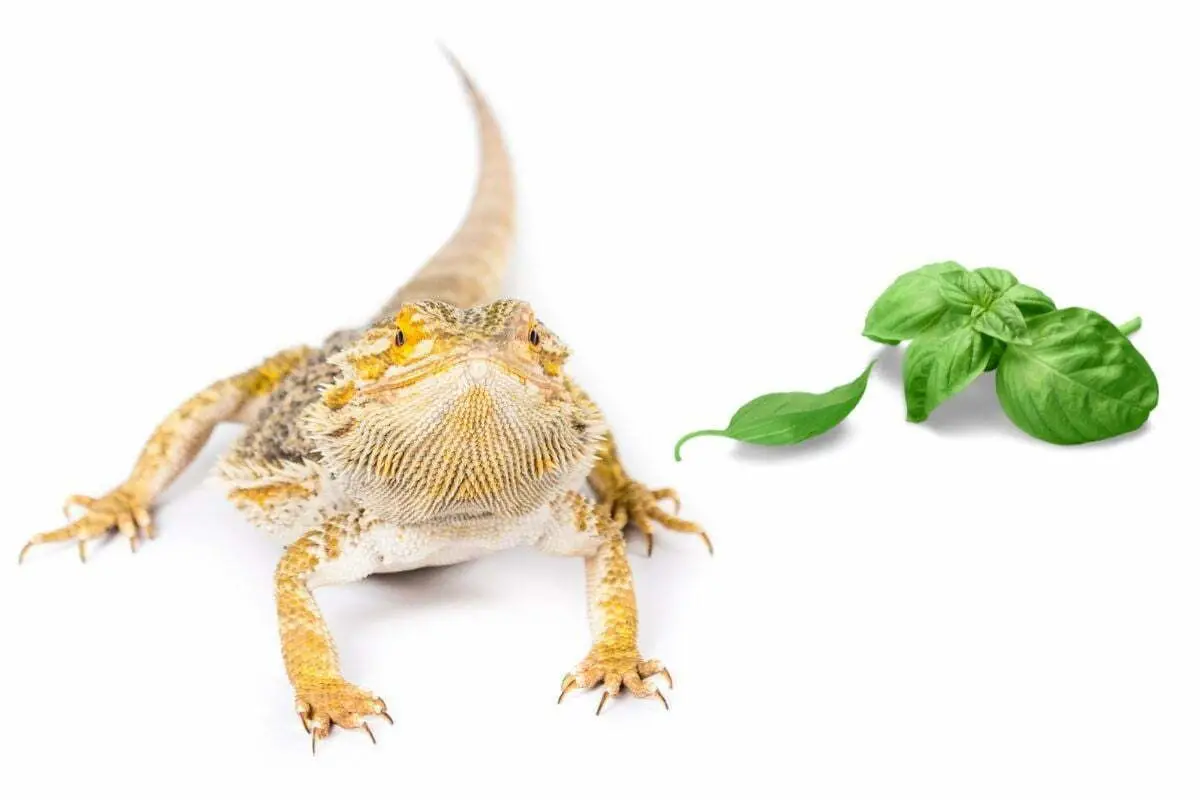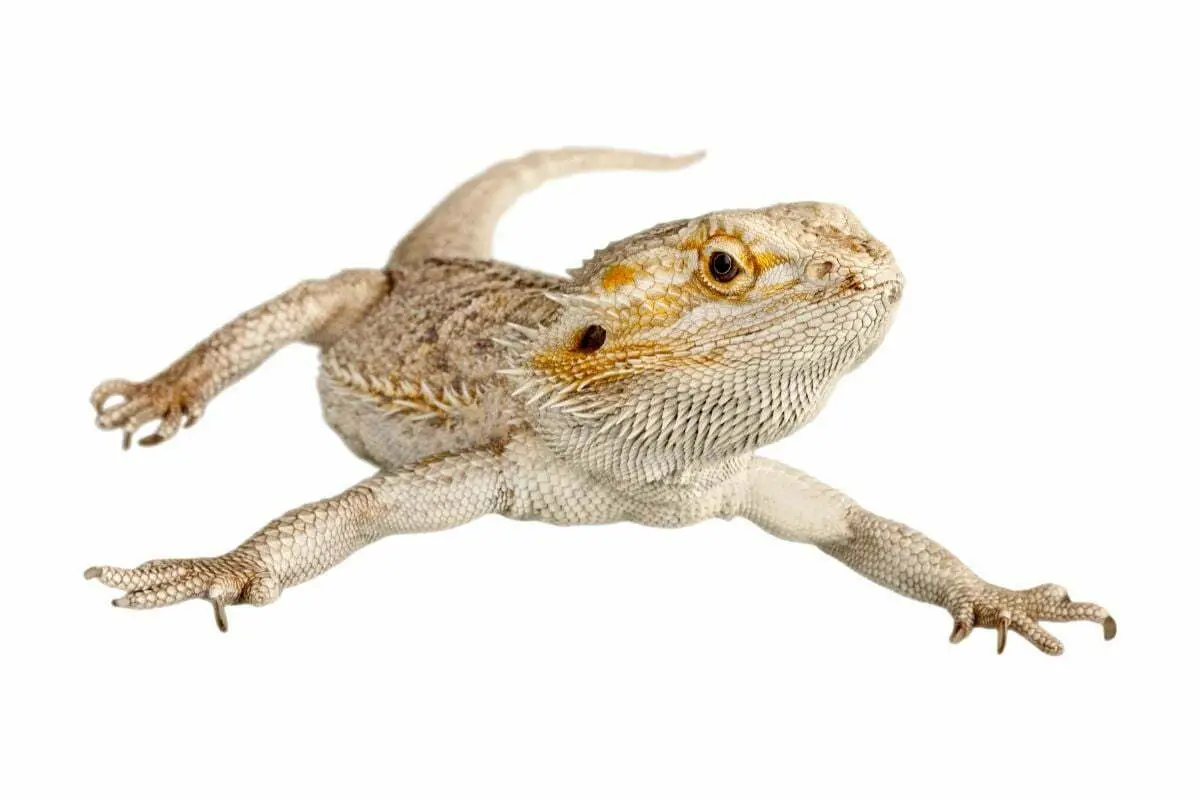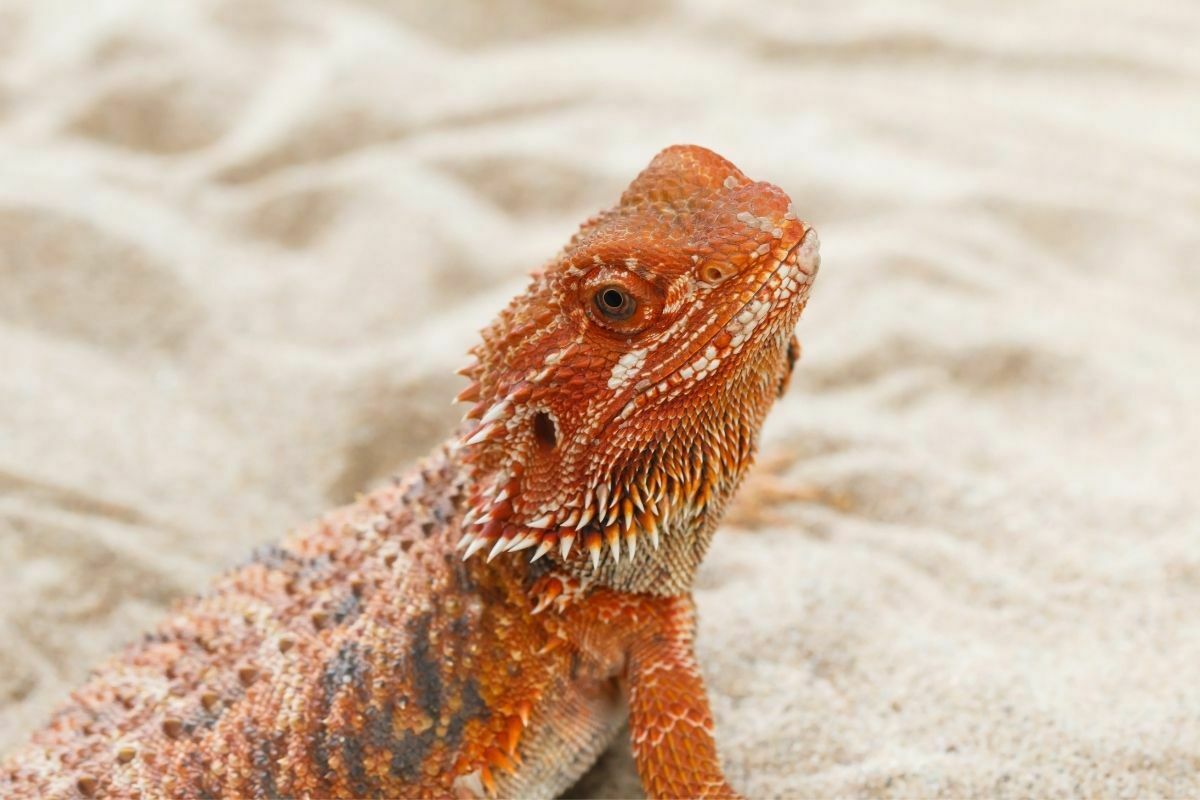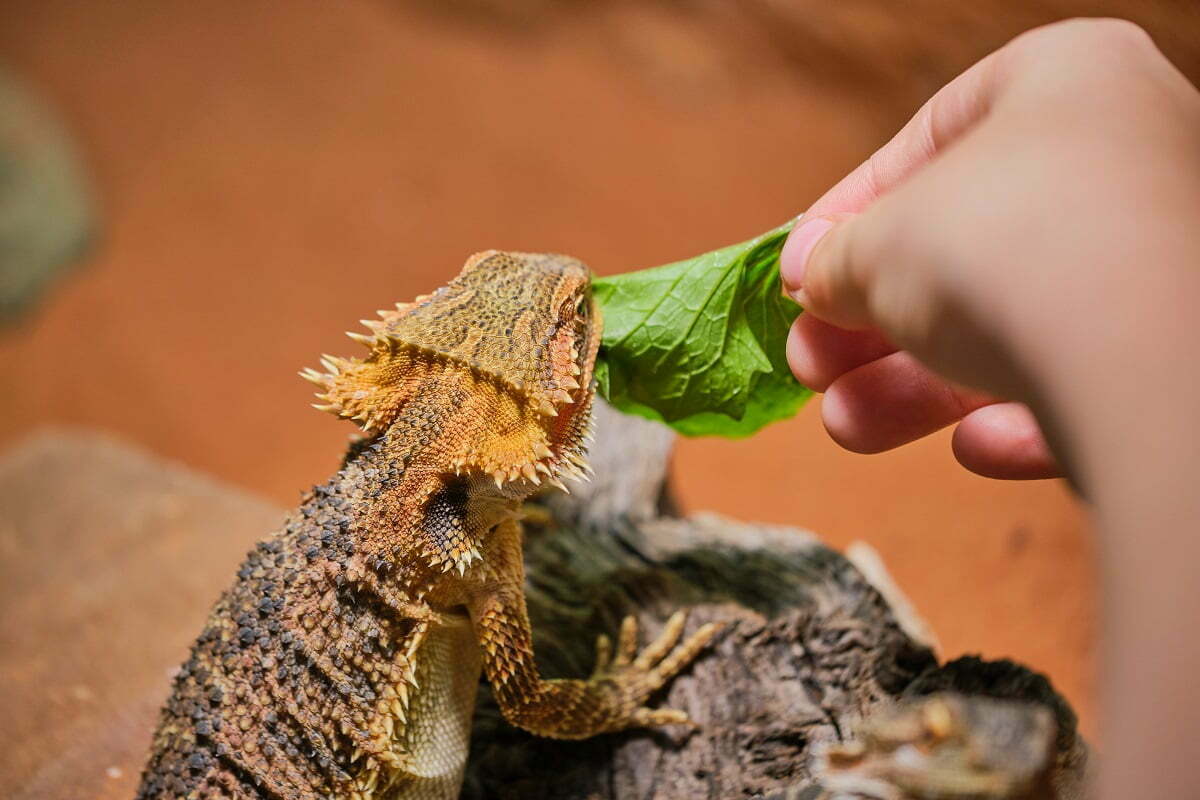Bearded dragons are omnivores, meaning they eat both plants and animals. Their diet consists mainly of insects, fruit, vegetables, seeds, eggs, and meat.

Basil is a popular herb in the kitchen that can be used to flavor food or tea. This is also delicious in curry and has been known to be very flavorsome to humans. But what about bearded dragons?
In short, the answer is yes, but there are some caveats. Keep reading this article, and we’ll do a deep dive into the relationship between your bearded dragon and basil to see if it is safe to consume this leaf and how often you should feed it.
Nutritional Profile Of Fresh Basil
By looking at the nutritional profile of this herb, then you can make a more accurate guess as to how this will affect your reptile’s body as well as whether or not it will have a toxic effect.
Now we’ll look at the nutrition content of fresh basil to see what properties it can offer your lizard:
Fresh Basil Info (Per 100 grams)
- Water: 96 grams
- Energy: 23 cals
- Protein: 3.15 grams
- Fats: 0.64 grams
- Carbs: 2.65 grams
- Fiber: 1.6 grams
- Sugar: 0.3 grams
- Calcium: 177 mg
- Iron: 3.17 mg
- Phosphorus: 56 mg
- Sodium: 4 mg
- Vitamin C: 18 mg
This also contains other vitamins and minerals that will definitely contribute to your animal’s overall well-being. These nutrients are especially important if your reptile is small and you want it to grow exponentially over time.
It is important to weigh up the pros of feeding your reptile basil along with the cons of doing so. If you feed it basil in moderation, then there’s no reason why it can’t lead a full, healthy, and happy life.
This is not the conventional food that a bearded dragon might eat in the wild, so it might take a little while for your creature to fully accept this herb into its diet.
Bearded Dragons – Can They Eat Dry Basil?
Dry basil leaves are available from most pet stores, but we don’t recommend using them because they’re not as nutritious as fresh basil.
The main difference is that dry basil doesn’t contain water, which means that it won’t dissolve properly in the digestive system of your reptile.
This could cause problems such as constipation and stomach upset.
The best way to get your reptile to eat basil is by giving it fresh leaves in its tank in a mix of other fresh vegetables. This means that the odors of the other vegetables might tempt the lizard into taking a bite of the whole thing.
Fresh basil also has a lot more nutrients, macros, and micros than it does when it is dried. This is because a lot of these are lost when you dry out food.
We would always recommend that you feed a bearded dragon the freshest ingredients that you can find, as this is the best method of having your reptile absorb the most amount of food possible.
The Pros Of Bearded Dragons Eating Fresh Basil

There are many reasons why you may want to give your lizard basil. The first one is that it tastes great!
If you’ve ever had basil growing in your garden, then you know just how good it smells. You can use this scent to entice your lizard into eating the leaves.
Another benefit of feeding your bearded dragon basil is that it helps keep their skin clean. When your lizard eats basil, it absorbs all the oils and bacteria on the leaves, which makes it easier to wash off afterward.
You should be careful, though, because too much basil can actually cause your lizard to become ill.
Basil Has Lots Of Calcium
One of the benefits of basil is that it contains lots of calcium. This mineral is essential for building strong bones and teeth in reptiles.
Your lizard needs about 150 milligrams of calcium per kilogram of body weight every day.
In order to meet this requirement, you need to make sure that you feed your bearded dragon at least 1 teaspoon of crushed or ground calcium each day.
Calcium is found in different forms in plants, including leafy greens like basil. It has around 177 mg of calcium per 100 grams.
You could also add a calcium supplement to your bearded dragon’s diet. This is a great way of improving your reptile’s calcium levels. However, you might need to smuggle this into your dragon’s food because it might be put off by the chalky texture and scent.
Basil Has Good Ratios Of Calcium And Phosphate
A healthy diet for your bearded dragon will include plenty of calcium and phosphorous. These two minerals help with bone growth and development.
As well as being beneficial for your lizard’s health, calcium, and phosphorus are also important for keeping your bearded dragons’ scales smooth and shiny.
When you feed your lizard basil, it will absorb both of these minerals along with the calcium from the leaves. In fact, phosphate is very important for the maximum absorption of calcium into your bearded dragon’s bloodstream.
We would recommend that you have the calcium/phosphate ratio at around 2:1. This will ensure that your lizard is getting the most amount of nutrients.
You’ll always need to be aware that your lizard needs to get a mixed diet. You’ll get calcium from other sources, and vegetables such as kale will be a rich source of this mineral.
What Other Benefits Does Basil Have For Bearded Dragons?
Aside from the benefits of basil mentioned above, there are a few more things that you should know about.
For example, basil is an excellent insect repellent. If you’re looking to keep bugs away from your lizard, then basil is a great option.
It works particularly well if you place some basil leaves inside your lizard’s cage.
The smell alone will deter insects, but the taste of the herb will also repel them.
Basil also has moderate amounts of vitamin C, as well as medium levels of vitamin A and large amounts of vitamin K.
Vitamin K is great for preventing blood clotting and maintaining healthy bones. This means that basil is a good choice for any reptile who suffers from brittle bones.
If you want to give your bearded dragon a boost of energy, then basil is a useful ingredient.
The Downsides Of Feeding Your Bearded Dragon Basil

Although basil can provide many benefits for your bearded dragon, it does come with a couple of drawbacks.
One of the main problems is that basil can cause diarrhea. The reason why this happens is because of its high content of oxalic acid.
This substance can irritate the digestive tract, causing loose stools.
Another problem is that basil can cause skin irritation.
This is due to the presence of thujone, which is one of the compounds found in the plant. Thujones are responsible for giving basil its distinct aroma.
However, this isn’t something that you’d need to worry too much about.
Because of their small size, bearded dragons aren’t likely to ingest enough thujone to become ill.
As long as you are offering your lizard basil as part of a varied diet, then you shouldn’t have your lizard experience that many problems. In fact, basil is a great addition to your lizard’s diet, as it is a rich source of some essential nutrients.
Will Your Bearded Dragon Eat Fresh Basil?
Fresh basil is another way that you can add variety to your bearded dragon’s diet. It has a very distinctive aroma that will certainly draw your lizard’s attention, even if it does not eat it straight away.
You should make sure that this meal is part of a balanced diet and not try to force your lizard to eat the basil. There are plenty of other sources that your lizard that can extract the same vitamins and minerals from.
Always start out with a small portion of basil, as your lizard will not be able to handle large portions, and it might also put them off eating it when you are introducing it into their diet.
How Much Basil Should You Give Your Bearded Dragon?
When you introduce new foods into your bearded dragon’s diet, it is best to start out slowly.
Start by feeding your lizard just a single leaf or two at first.
If they don’t seem interested in it, then you can increase the amount gradually over time.
Once you’ve introduced basil into your bearded dragon’s food, then you’ll probably find that he begins to enjoy it more than his previous meals.
Can Young Bearded Dragons Consume Fresh Basil?
Yes, young bearded dragons can consume fresh basil. However, it is important that you only feed them a small amount at first.
They may not like the strong scent of basil, so it is better to wait until they are older before adding it to their diet.
As we have mentioned earlier, this leaf is a good source of calcium and other vitamins like vitamin K, which will be very important to your lizard’s health. If your lizard is growing, then it will need all the nutrients that it can get.
You should make sure that staple greens are always included in your young lizard’s diet. This includes things like collard greens and dandelion greens. Mix the basil in with these greens to ensure that your dragon gets as many nutrients as possible.
Preparing Fresh Basil For Your Dragon

Bearded dragons love fresh herbs, especially basil. But what is the best method of preparing this herb to ensure that it will eat it as part of a balanced diet?
So, if you want to keep your lizard happy and healthy, then you should prepare fresh basil for him.
The easiest way to do this is to simply chop up the leaves and place them on top of your bearded dragon’s bedding.
It is important that you use fresh basil, as dried basil doesn’t contain the same nutrients. So, if you buy your basil in bulk, then you should store it in an airtight container.
This will help to preserve its freshness and prevent it from going rancid.
Organic Prep
Another option is to grow your own organic basil plants. Growing your own herbs is one of the most rewarding things that you can do for your bearded dragon.
Growing your own herbs means that you know exactly where they come from and how they were grown.
Growing your own basil is easy to do, but there are some things that you need to consider before doing so.
First of all, you should ensure that you select the right type of soil for growing basil.
You should choose something that has plenty of moisture and nutrients. The ideal soil for growing basil is clay-based, so you should look for a potting mix that contains peat moss.
You should also plant your basil seeds directly into the soil rather than using any kind of seedling starter.
When you’re ready to transplant your basil plants, you should leave the roots exposed. This allows the basil to continue absorbing water and nutrients through its root system.
Washing The Basil
Once your basil plants begin producing leaves, you should wash them regularly. You don’t want to let dirt or debris build up on your plants because this could cause problems when it comes time to harvest the leaves.
You should also remove any insects that might be living on your plants. These pests can damage your basil leaves and even spread disease.
Harvesting The Leaves
After washing your basil leaves, you should dry them by hanging them upside down over a paper towel.
This process is known as sun drying, and it helps to preserve the flavor and nutritional value of your basil leaves.
If you live in an area that experiences extreme temperatures, then you may want to put your basil plants outside during the summer months.
Cooking The Basil
You should not bother to cook your basil before feeding, as your lizard will eat it all up regardless, and you want to preserve as much of the original nutrient quality as possible.
However, you should always make sure that your basil is thoroughly chopped before serving it to your lizard.
You can dice the leaves up finely and then sprinkle them on the other leaves. This way, you can be sure that your lizard will be getting the maximum amount of nutrients necessary, and your lizard will not be put off.
Serving
All you have to do is serve the basil as it comes. Your bearded dragon will not be that concerned with the decoration of its food. Just make sure that the basil is easy for your bearded dragon to ingest.
What Other Herbs Can You Feed A Bearded Dragon?

Basil isn’t the only herb that you can feed your bearded dragon. There are many different types of herbs that you can use to supplement their diet.
One of the best options is parsley. Parsley is rich in iron, which is essential for healthy growth.
Another good choice is rosemary. Rosemary provides your lizard with vitamin C and calcium.
Rosemary also contains antioxidants, which help prevent free radicals from damaging your lizard’s cells.
Frequently Asked Questions
Can I Feed My Bearded Dragon Basil?
Yes, you can feed your bearded dragon basil. However, you must remember that basil does not contain enough nutrition for your lizard to thrive.
What Is The Best Diet For Bearded Dragons?
There are many different diets available for bearded dragons. Some people prefer to use commercial foods, while others opt for homemade diets.
How Often Should I Feed My Bearded Dragon?
Most owners feed their lizards once every two days. Young dragons should be fed once a day. However, if you notice that your lizard is losing weight, then you should increase the frequency of feeding.
How Long Does It Take For A Bearded Dragon To Grow?
Depending on the size of the lizard, growth rates vary from one month to three years.
Where Can I Buy A Bearded Dragon?
If you are looking for a pet store where you can purchase a bearded dragon, then you can visit Petco. They offer a wide variety of reptiles, including bearded dragons.
Our Final Say
Thank you for reading our article about how to care for a bearded dragon and whether or not you can feed it basil.
